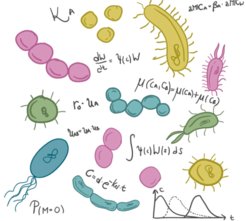When germs become resistant and mathematics can help
Plön Winter Talks at the Max Planck Institute for Evolutionary Biology
The second lecture in this year's series of Plön Winter Talks at the Max Planck Institute for Evolutionary Biology (MPI) will be given by Christin Nyhoegen, from the Department of Evolutionary Theory. Her talk deals with the spread of drug resistance and sheds light on how mathematics can help find solutions.

The spread of drug resistance is a very big problem in the treatment of bacterial infections. Many antibiotics that led to rapid treatment success only a short time ago now seem to be ineffective. Through excessive and sometimes even incorrect use of antibiotics, mankind has deliberately ensured that mainly those bacteria spread that have developed a resistance to these drugs. It is therefore time to rethink the way antibiotics are administered. This could prevent resistance to antibiotics that are still effective from spreading in the future. This is where mathematics comes into play and shows ways that could lead to a solution to this problem.
Christin Nyhoegen is a PhD student in the Department of Evolutionary Theory at the Max Planck Institute for Evolutionary Biology in Plön. Here she works primarily with mathematical models that describe the spread of resistant bacteria during antibiotic treatment. The aim of her research is to understand which factors influence the success of antibiotic therapy in patients and how such treatment can be optimised. Christin Nyhoegen studied mathematics in medicine and life sciences at the University of Lübeck.
Her lecture will take place on 24 January at 7 pm in the lecture hall of the Max Planck Institute in Plön. The lecture hall is located in the interim building opposite the main entrance. Registration is not necessary. Admission is from 6.30 pm.
